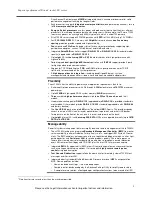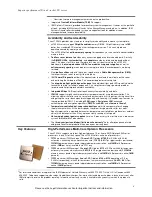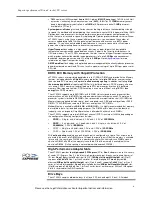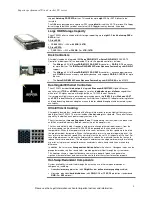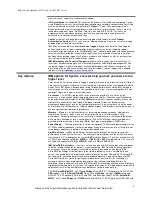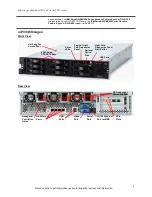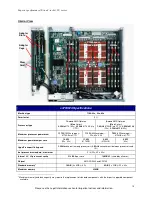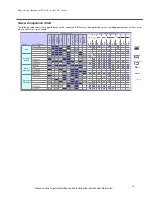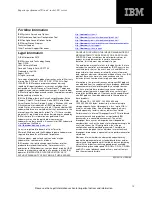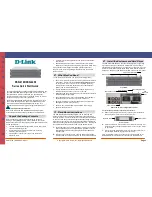
Superior performance/U in a 4-socket, 2U server
Please see the Legal Information section for important notices and information.
1
Product Guide
August 2010
IBM
System x3755 M3
Product Overview
CONTENTS
Product Overview
1
Selling Features
1
Key Features
3
Key Options
8
x3755 M3 Images
9
x3755 M3 Specifications
10
The Bottom Line
12
Server Comparison Chart
14
For More Information
15
Legal Information
15
Outstanding price/performance for mid-size workloads
Suggested Uses:
Businesses requiring a rack-optimized compute-dense server for business
intelligence, midsized databases or virtualization, ERP, HPC, and the like.
The challenge today is to squeeze as much performance out of your IT dollars as possible, while
saving cost on features not needed. The
four-socket,
IBM
®
System
x3755 M3
, incorporating
IBM
X-Architecture
™
features, meets that challenge. It was designed to eliminate system
architecture bottlenecks through the use of separate, high-speed links between the processors,
main memory and I/O. It is well suited for application workloads that benefit from a 4-processor
system with outstanding price/performance, offering high compute density, large memory
capacity, and high I/O throughput, all in a small rack footprint. Up to
21
x3755 M3 servers can be
installed in a single 42U rack, offering the compute density of up to
84
processors (
1008
processing cores) per rack.
The x3755 M3 supports the latest
12-
and
8-core
AMD
Opteron
6000 series processors with
DirectConnect Architecture and HyperTransport technology, to offer impressive computing power
in a
2U
rack-optimized design.
This server offers, up to
48
processor cores,
high memory
bandwidth
, and
high floating-point performance
at an affordable price. The x3755 M3 offers
up to
256GB
1
of industry-standard
1333MHz
DDR3
(
PC3-10600
) memory with
Chipkill
™
ECC
(Error Checking and Correcting) protection—for high performance and reliability. For even higher
levels of availability, the x3755 M3 also offers
online
memory sparing
.
Two dual-port
integrated
Gigabit Ethernet
controllers are standard—offering
TOE
(TCP offload engine) and
RDMA
support,
load-balancing
and
failover
capabilities, along with
four
high-performance
PCIe
Gen 2
adapter slots.
All models offer support for
two
or
four processors
and a choice of high-performance hard disk
drives with an internal storage capacity of up to
16TB
(
eight 3.5-inch hot-swap SATA
drives) or
4.8TB
2
(
four 3.5-inch hot-swap SAS
drives). The integrated
ServeRAID
™
SAS
(Serial Attach
SCSI)/
SATA
(Serial-attach ATA) controller provides hardware-based
RAID-0/1/10
or
RAID-
0/1/10/5/50
support standard (model-specific). Additional RAID support is available via upgrade.
Standard in the x3755 M3 is an integrated Baseboard Management Controller (iBMC) that
enables the user to manage and control the server easily—both locally and remotely. This high
level of manageability is designed to keep costs down and the system up.
A pop-out/drop-down
light path diagnostics panel
enables quick servicing of the system if a problem develops.
These advanced features help maximize network availability by increasing uptime, as do
integrated
RAID
;
temperature-controlled fans
;
IPMI 2.0
support, including
highly secure
remote power control
and
Serial over LAN
; as well as
text-console redirect over LAN
.
Another improvement in the new generation of X-Architecture is the replacement of legacy BIOS
with a new generation
Unified Extensible Firmware Interface
(UEFI). UEFI provides a more
intuitive user interface and understandable event logs and better management.
With the inclusion of unique IBM service and support features such as
IBM Active Memory
™
, the
iBMC, UEFI, light path diagnostics,
IBM Systems Director
,
IBM ServerGuide
™
, and others, the
x3755 M3 is designed for maximum uptime.
If you need highly manageable, quad-socket/multi-core price/performer in a rack-dense 2U
package, the x3755 M3 is the ideal system.
Selling Features
Price/Performance
The x3755 M3 offers numerous features to boost performance and reduce product and operating
costs:
•
Up to
four 12-
or
8-core
Opteron 6000 series processors with HyperTransport Technology,
1
Maximum memory and disk capacity may require the replacement of standard components with the largest supported component
available.
256GB
capacity using
8GB
DIMMs requires a
4-processor
system in order to use all
64
sockets. In a two-processor
configuration, only
16
total DIMM sockets are available; thus a two-processor system is limited to
128GB
of RAM (16 x 8GB).
2
GB equals 1,000,000,000 bytes when referring to hard disk drive capacity. Accessible capacity may be less.


